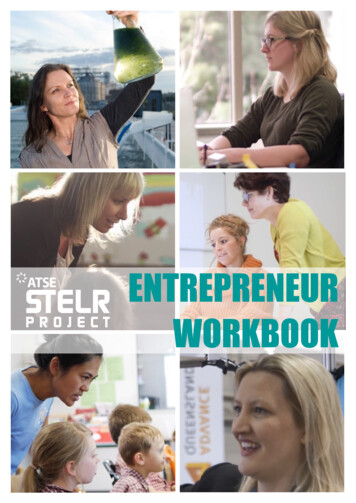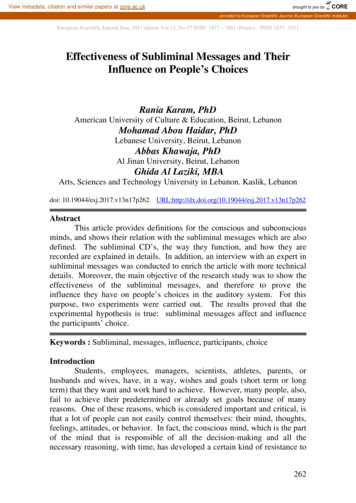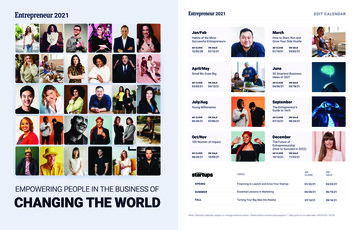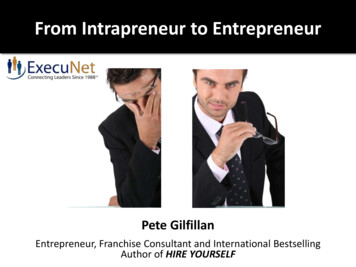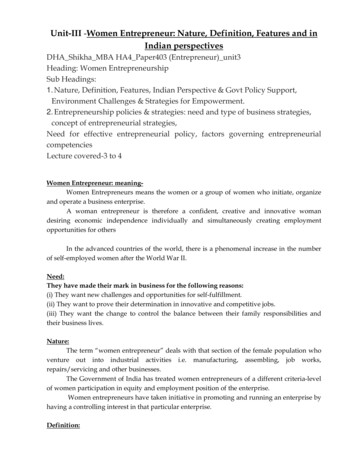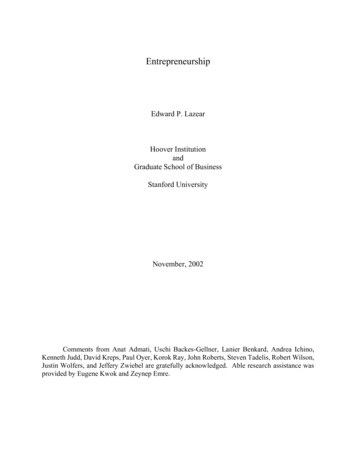
Transcription
The Entrepreneur Mind100 Essential Beliefs, Characteristics, and Habits ofElite EntrepreneursKevin D. JohnsonJOHNSON MEDIA INC.
ContentsForewordIntroductionChapter 157Strategy131. Think Big152. Create New Markets213. Work on Your Business, Not in Your Business234. All Risk Isn’t Risky255. Don’t Waste Time276. Build a Company That Is Systems-Dependent, Not29People-Dependent7. Ask for Help318. Business Comes First, Family Second349. Do What’s Most Important First3610. Hire a Good Lawyer3811. The Business Plan Is Overrated4012. Require Criticism and Disagreement in Your Company4213. Fire Your Worst Customers4414. Make Money While Doing Nothing4715. Outsourcing Makes Sense4916. Move On Fast from a Bad Business Idea5117. A Bad Economy Is a Great Opportunity5318. Adopt Technology Early5519. Ignorance Can Be Bliss5720. Adapt to Change Quickly5921. Technology Is an Opportunity, Not a Threat6122. Always Follow Up6323. Have Laserlike Focus6624. Nonprofit Really Means Profit68
25. Explore New Adventures for Inspiration26. Failure Doesn’t Kill You; It Makes You Stronger27. Seek Partnerships for the Right Reasons28. Be a Master at Leveraging Resources29. An Idea’s Execution, Not Its Uniqueness, Yields Success30. Find an Enemy31. Don’t Underestimate Your Competition32. Ask for What You Want33. No Competition Means Your Idea Probably Has LittleMerit34. Put Out Fires Quickly35. Have an Exit Strategy717475788183858789Chapter 297Education929436. School Is Not Necessarily Education9937. You’re in No Rush to Get an MBA101Chapter 3People10538. Spend the Majority of Your Time with People Smarter107Than You39. Office Space Is Not a Priority, But a Good Team Is10840. What You Wear Isn’t What You’re Worth11041. You Don’t Always Have to Be the Smartest One in the113Room42. Talent Trumps Seniority11543. You Are Odd, and It’s OK11644. People Don’t Only Work for Money11845. You Have a Sidekick12046. Don’t Let People Abuse Your Flexibility12247. Don’t Manage People, Manage Expectations12448. Get the Right Mentor12649. Choose Your Spouse Wisely12750. Fire Unproductive People129
Chapter 4Finance13351. You Don’t Need Money to Make Money13552. Pay Taxes Quarterly13753. A Check in Hand Means Nothing13854. Avoid Negative Cash Flow14055. Borrow Money from a Bank before You Need It14256. Prepayment Is King; Disregard Standard Payment144Terms57. Hiring a Professional Accountant Is Money Well146Spent58. Manage Debt Well14959. There’s a Downside to Having Investors15160. Focus on Building Revenue15461. The Biggest Investment in Your Company Is Yours15662. Use Different Banks to Minimize Risk15863. Know Your PAYDEX Score161Chapter 5Marketing and Sales16364. You’re in Sales, Whether You Want to Be or Not16565. Your Customer Is Your Boss16766. You Have Sales before You Have a Business16967. You Aren’t Always the Best Person to Close a Deal17168. Networking Isn’t All about You17469. Don’t Waste Time on People Who Can’t Say Yes17570. There’s No Such Thing as a Cold Call17771. Tell Everyone about Your Business17972. Ask the Right Questions18273. Receive the Maximum Value for Your Products or184Services74. Don’t Patronize Customers18675. Build Your Network Creatively18976. Don’t Hold Grudges191
Chapter 6Leadership19377. Act in Spite of How You Feel19578. Push beyond Your Fear19679. Be a Maverick19880. Make Your Dreams Come True20081. Make Difficult Sacrifices20282. You Have Unbelievable Endurance20483. Be Prepared to Lose It All207Chapter 7Motivation20984. Being Successful Is Not the Goal21185. You Are Excited When Monday Morning Arrives21386. You’re Disappointed When Friday Arrives21587. A 9-to-5 Is Worse Than Death21688. Your Parents Want You to Get a Real Job with Benefits21889. You Sometimes Get More Resentment than Respect22090. It’s Not about Being Your Own Boss22291. Entrepreneurship Is in Your Blood, Literally22492. You Know Your Worth22693. You Can’t Keep a Job22894. You Cry When Things Don’t Go Your Way22995. It’s Never Too Late to Be an Entrepreneur23196. You Feel Unequaled Joy When Your Idea Becomes233Reality97. Following Your Passion Is Bogus23598. You Have the Right Motivation23699. You Love Your Life239100. You’re an Entrepreneur Forever241AfterwordAcknowledgmentsAbout the Author245247253
ForewordThe secret of success in life is for a man to be ready for hisopportunity when it comes.—Benjamin Disraeli, prime minister, United Kingdom (1868, 1874-1880)While finishing this book, Johnson Media Inc., the smallcompany that I started as a college sophomore in2000, beat two other companies in a bid for a 40 million project. The project, which spans three years, is the largest account that my company has ever won. Johnson Media Inc. willnow be one of the most prominent companies in the marketing industry.In late July 2012 I received an e-mail and phone call from thevice president of a national organization who was impressed withmy company’s work in the financial services industry. The vicepresident asked us to submit a proposal for the organization’s major project. I agreed without hesitation.Although I was on vacation visiting my family in Chicago, Iwent right to work, summoning my team to focus all efforts onwinning this project. Also, I immediately reached out to two men-
The Entrepreneur Mindtors whose companies have made millions to get their support andguidance. My team and I finished our winning proposal weeks before the deadline, giving the client the impression that we were allbusiness and that we made their project top priority. It paid off.I mention this major accomplishment because it is a testamentto the effectiveness of the principles discussed in this book. In TheEntrepreneur Mind I detail how elite entrepreneurs respond quickly, put their business first, consult with mentors often, hire the bestteam, create an environment of stressful urgency, use time wisely,and so on. The one hundred lessons in this book are precisely thebasic principles that I have used to build a multimillion-dollarcompany at a young age.This is not just another book on entrepreneurship that focuseson high-level theory or popular thought, but a pragmatic approachthat will get you results. In your hands, you have a real playbook tohelp you accomplish your entrepreneurial dream, whether beingable to determine your own destiny or winning a multimilliondollar account. If you learn from my experiences and the lessons ofhigh-performing entrepreneurs, then you are on the path to success.If you adopt these principles and believe in them wholeheartedly,then success awaits you.6
IntroductionTo be an entrepreneur is to think differently. While mostpeople seek refuge, entrepreneurs take risks. They don’twant a job; they want to create jobs. Their goal isn’t tothink outside the box as much as it is to own the box. Entrepreneurs don’t follow the market; they define the market. This boldand seemingly backward way of thinking I refer to as the Entrepreneur Mind.How does one develop the Entrepreneur Mind? Debate aboutthis question never ends. Everyone from scholars to entrepreneursthemselves wonder if consciously developing such a mind-set iseven possible. Some people believe that entrepreneurs are born,that certain individuals are ordained to be entrepreneurs, gifted atbirth with the right mix of characteristics and circumstances. Others believe that entrepreneurs can be developed through a combination of coaching, education, and experience.
The Entrepreneur MindThe idea that entrepreneurs are born, not made, is ridiculous.Contrary to what many erroneously believe, entrepreneurship canbe taught and learned. The fact that over six hundred thousand college students were enrolled in some type of entrepreneurship curriculum in 2011, up from less than 1 percent of that amount a decade before, is a testament to the growing belief that entrepreneurship has a respectable place in academia. In many ways, entrepreneurship is like any other major discipline that requires intensestudy and practical experience.Although I didn’t have the benefit of studying entrepreneurshipin a formal classroom setting, I did learn by reading books, manyof which I still have in my library and use as references. Trips tothe bookstore were a natural first step once I decided to go intobusiness. With teeming excitement and eagerness I bought andread High-Tech Start Up: The Complete Handbook for CreatingSuccessful New High-Tech Companies by John L. Nesheim. Oneof my favorite books was Netscape Time: The Making of the Billion-Dollar Start-Up That Took on Microsoft by Jim Clark. Bookslike these formed the foundation of my education in entrepreneurship. Without them, I would have probably given up from the frustration of trying to figure out everything on my own and to motivate myself.This book is an attempt to add a fresh and practical perspectiveto the wealth of knowledge available about how to be an entrepreneur. As I developed as a young entrepreneur and experienced different situations, I realized that few books offered the kind of succinct advice that I now give to my mentees. By telling my personalstories and relating those of other successful entrepreneurs, I setout to write a book that focuses on one hundred core lessons thatteach entrepreneurs what they may not find in a textbook, magazine, or online. These lessons range from how to think big to whyyou should use multiple banks, and even include whom you shouldchoose as a spouse.8
IntroductionFurthermore, my goal in writing this book is to help young entrepreneurs avoid the mistakes I made. Mistakes during the earlydays of a business can be devastating. A bad decision such asspending too much money or choosing a bad business partner canlead to an entrepreneur having to shut down operations completely.After making some of my biggest mistakes, I would often think, Iwish there were a book out there that would have warned me aboutthis. Now that book exists, and I can help people who may havethat same wish.This book is divided into seven parts: Strategy, Education, People, Finance, Marketing and Sales, Leadership, and Motivation.Each part contains relevant nuggets of wisdom that you can readseparately or sequentially. Feel free to jump around based on yourinterests or read the book from beginning to end.Whether you are thinking of starting a business, celebratingyour first year in business, or approaching ten years in business,you’ll find tremendous value in reading this book. Simply put, itwill help you to develop the Entrepreneur Mind.9
Chapter 1StrategyStrategy is a style of thinking, a conscious and deliberateprocess, an intensive implementation system, the scienceof ensuring future success.—Pete Johnson, British businessmanAll entrepreneurs must ask themselves three vital questions that concern their business strategy: Where arewe now? Where do we want to be? How do we getthere? If you don’t know the answers to these questions, you don’thave a strategy for success. Instead, you have an aimless, businesspursuit and a likely failure on your hands.Businesses with a clear and a solid strategy are prepared to win.Companies with inferior products often beat companies with superior products because, while the big dogs rest on their laurels, theunderdogs are implementing and executing a better strategy. In addition, they may have better partners, employ sharper lawyers, orautomate more processes. A company’s strategy and tactics canhelp it surmount what seem like impassible obstacles.In this chapter, you learn about strategies and tactics to improveyour business, ranging from testing a new market to devising anexit plan. Mastery of these important concepts will put your business ahead of the rest.
Strategy1) Think BigIt must be borne in mind that the tragedy in life doesn’t lie in notreaching your goal. The tragedy lies in having no goal to reach. . . .It is not a disgrace not to reach the stars, but it is a disgrace to have nostars to reach for. Not failure, but low aim is sin.—Benjamin E. Mays, minister, educator, scholar, social activistThe Two Types of Failure in BusinessA business can fail in two ways: not surviving beyond its startand not reaching its full potential. While shutdowns receive themost attention, failure to reach full potential is much more catastrophic.On the one hand, measuring and understanding why so manybusinesses fail in the traditional sense is relatively easy. We havethe data. Organizations ranging from the Kauffman Foundation tothe U.S. Chamber of Commerce have analyzed years of statistics,giving us a solid idea of why about 75 percent of businesses do notsurvive fifteen years or more. Some of the reasons for failure include undercapitalization, overexpansion, poor planning, and a declining market.On the other hand, measuring and understanding why a businessfails to maximize its potential is quite difficult. Studies and statistics aren’t readily available. Also, the default measuring stick forsuccess in business is often the very existence of the business itself. I am guilty of perpetuating this low expectation, frequentlycongratulating business owners for having survived their first fiveyears. While this accomplishment is honorable, it’s more impressive to have a profitable and a high-growth business after fiveyears. Instead of flattering business owners who have reached acertain number of years, the goal should be to challenge and tohelp solid businesses ascend to the next level—to think big.15
The Entrepreneur Mind“Thinking Big” DefinedThe phrase ―Think big‖ is ubiquitous, whether it’s from anESPN commentator or Donald Trump. Likewise, a popular T-shirtcarries the phrase, ―Go big or go home!‖ Apparently, we have anepidemic of small thinkers, and we must be cured of this contagious inability to think big. Despite its popularity and ascendancyto pop culture status, the saying has no clear meaning, especially asit relates to business.In business, ―thinking big‖ simply means pursuing ideas thatmaximize the scope of your potential. Likewise, it can mean pursuing ideas that have maximum impact in the world. Despite its simple definition, thinking big is difficult to do for many reasons, butif you are aware of the obstacles you can avoid them altogether.1. One of the main obstacles to thinking big is the inability tooutgrow your environment. I am a mentor to several young entrepreneurs, and one of the common disappointments I have about mymentees is their inability to create businesses that go beyond theconfines of their reality or environment. In other words, their environment restricts their thinking to the point that their business suffers limited growth or even death.To counter this effect I provide examples of entrepreneurs whohave gone outside their environment to succeed. For example,many college students wish to start a business that targets only college students on their own campus. Instead, I encourage them toexpand their markets by applying their product or service to additional segments. Students, for instance, could sell their product orservice to colleges across the nation or the world. If the idea hasbroad appeal, it could be even larger. Also, I share with my collegementees how Facebook, originally for college students only, wasfounded on an ideology that appeals to people all around the world.It was just a matter of time before Facebook’s cofounder MarkZuckerberg expanded his company’s target from college studentsto everyone on the planet.16
Strategy2. Many entrepreneurs lack the motivation to pursue big ideas. Ifind this mentality prevalent among entrepreneurs who have hadsome level of monetary success in business that diminishes theirwillingness to pursue bigger ideas. These entrepreneurs strive tomaintain their comfort or have become accustomed to going forlow-hanging fruit. As business author Michael Gerber says, ―Comfort makes cowards of us all.‖ Moreover, these entrepreneurs couldsimply be overwhelmed with running their own business and don’thave the bandwidth to do anything else.For overcoming lack of motivation, entrepreneurs should findan individual or team to hold them accountable for pursing theirbig idea, step by step. I know that staying motivated can be difficult. However, having people hold me accountable for my goalshas really worked. Moreover, if you have several businesses like Ido, you have to delegate tasks to others and carve out priority timeto develop your idea. Otherwise, you make little progress.3. Several entrepreneurs lack the self-confidence to think big.They don’t see themselves running a large organization, or they arefrozen by the immensity of their idea. They may ask themselves,Where do I start? How will I build a team capable of pulling thisoff? Where will I get the start-up capital for such a huge idea?To boost your self-confidence, devise and take small steps thatstart you working on your idea. For example, do some basic research about your idea or write down your ideas. If you are likemost people, these small wins will add up to increase your confidence and to propel you forward.4. Entrepreneurs often lack the diversity and expertise of influencers required to think and eventually to execute in a big way. Iam a fan of the television show Shark Tank in which entrepreneurspitch their business idea to a panel of investors, or sharks, whothen decide whether to place an investment with the presentingcompany. Entrepreneurs who appear on the show seek investmentcapital as much as the valuable experience of the sharks. In oneepisode, a shark suggested that an entrepreneur license his product17
The Entrepreneur Mindinstead of selling it to individual retailers, an arduous process. Theentrepreneur had not thought about licensing his product, a strategythat would yield him profits faster and minimize risk. In this caselike so many others, the founder needed the experience and influence of seasoned entrepreneurs to maximize the potential of abusiness idea.To jump this hurdle, you must establish a diverse network ofindividuals who think big and understand what it takes to arrive atthat level. Likewise, they can help you to vet and improve youridea. Reid Hoffman, founder of LinkedIn, recently told a group ofaspiring entrepreneurs in Cambridge, England, ―Talk to as manypeople as you can. What you want are the people who will tell youwhat’s wrong with your idea. They are the ones you can learnfrom.‖My First Big IdeaLike many of my college mentees today, I was unable to thinkbig during my early start-up days, because I was limited by my environment. Also, my network at the time didn’t include older entrepreneurs who could help me translate the value of my collegewebsite to a larger, more profitable audience. By the time I realized the great potential of my idea, it was too late. Well-funded andtalented competitors seized the larger market aggressively while Ifocused on increasing my success in my small-college microcosm.Had circumstances been different, I could have been a formidablecompetitor to companies like CollegeClub.com, or even Facebookitself.Despite the missed opportunity of becoming a national or evenglobal college web portal, all was not lost. Eager to move on fromserving the college market and making my mark in a bigger area, Istumbled upon an opportunity that would forever change how Ipursue business ideas. I decided to focus on commercializing aninternal tool that I created to help my staff update web pages with18
Strategyout having to know computer programming languages. OmniPublisher, one of the first online content management systems—similar to an early WordPress—was my first product with globalappeal. From that point I began to think big and never returned tothinking small.We sold OmniPublisher to local community newspapers andother publishers to simplify making frequent updates to their websites and to automate archiving with a portable database. OmniPublisher also helped users with small budgets to obtain enterprise-like software that normally would cost them much more tobuild or to purchase from an established vendor. My company hadregional success with the project and eventually sold OmniPublisher to a small publishing company. During an early consolidation period, companies with software similar to my company’s were acquired for millions of dollars. My dream of selling to alarge media conglomerate at a higher valuation didn’t comethrough, but I sleep well at night knowing that I dreamed big andwent for it.Where Thinking Big Helps the MostI contend that the aggregate loss of value by businesses that failto reach their potential is much greater than the value lost by businesses that cease to exist. Some compelling statistics support thisposition, as reported in a recent Technology Association of Georgia (TAG) proposal:According to the YourEconomy.org website (created by theEdward Lowe Foundation from Dun and Bradstreet data), from2000–2007, most new job creations in the United States wereprovided by Stage I (1–9 employees) companies (approximately5.7 million). However, over this period of time, new jobs byStage I companies were created at a rate of 1.5 per new company, whereas Stage II (10–99 employees) companies created newjobs at a rate of 26 per new company. The website further indi19
The Entrepreneur Mindcates that since 2000, Stage IV (500 or more employees) companies have yet to create one new net job. Instead, they havelost approximately 2.5 million jobs.For this reason, economists, entrepreneurs, and others interested ineconomic development should not necessarily emphasize fosteringstart-up growth. Instead, they must emphasize helping establishedbusinesses and leaders transform their operations from medium tolarge. In other words, increasing the number of new start-ups isless important than ensuring the full maturation of establishedcompanies that have tremendous and sustainable growth potential.How do we move medium-sized businesses to become big enterprises? Many economic developers are asking themselves thatquestion today and are working diligently to answer it. One approach, economic gardening, is addressing the challenge and seeing great results, especially in Florida. As defined by the KauffmanFoundation, economic gardening is an economic developmentmodel that embraces the fundamental idea that entrepreneurs driveeconomies. The model seeks to create jobs by supporting existingcompanies in a community. Economic gardening also develops anentrepreneur’s mental ability to think big and provides resources tomake it happen.Making the jump from thinking small to thinking big can be extremely difficult, but it is worth it. In fact, all of the greatestachievements of humanity started with a daring, big idea. Imaginewhere we’d be if the inspiring words of the great Benjamin E.Mays that encourage us to think big hadn’t inspired a young student at Morehouse College who dreamed of living in a differentworld than the one in which he found himself. Martin Luther KingJr., one of the most known icons in the world today, could havesettled for being just a preacher in his hometown of Atlanta, Georgia. He never would have set out to accomplish his dream, a visionthat changed our world forever. People with the ability and the audacity to think big carve the path to greatness.20
Strategy2) Create New MarketsIf I had asked people what they wanted, they would havesaid faster horses.—Henry Ford, founder, Ford Motor CompanyThe two kinds of entrepreneurs are those who create markets andthose who do not. On the one hand, the entrepreneur who createsmarkets is considered a revolutionary. On the other hand, the entrepreneur who competes in well-established markets is consideredordinary. Both approaches can lead to success in business, but research indicates that the creative entrepreneur has a better strategicposition.Blue Ocean Strategy, a best-selling business book, makes a cogent argument that creating new markets known as ―blue oceans‖is better than competing in overcrowded industries known as ―redoceans.‖ The authors, W. Chan Kim and Renée Mauborgne, studied 150 strategic moves spanning more than one hundred years and30 industries for their book. They also looked at 108 companiesthat launched new businesses to quantify the impact on revenuegrowth and profits of creating blue oceans. Kim and Mauborgne’sfindings are remarkable:We found that 86 percent of the launches were line extensions,that is, incremental improvements within the red ocean of existing market space. Yet they accounted for only 62 percent of total revenues and a mere 39 percent of total profits. The remaining 14 percent of the launches were aimed at creating blueoceans. They generated 38 percent of total revenues and 61 percent of total profits.According to these data, it pays to create blue oceans. The bookgives solid examples of successful companies that created newmarkets, including Yellow Tail, Cirque du Soleil, Ralph Lauren,and Lexus. It also provides a step-by-step process for executing21
The Entrepreneur Mindblue ocean strategy. I highly recommend that you buy a copy ofthe book.As a mentor to young entrepreneurs, I encourage my mentees toseek new markets rather than to go into well-established ones. Thepotential for attaining greatness is in creating new markets. Myfirst start-up was a blue ocean, or a blue pond considering the sizeof my market. In my microcosm of a college campus, I created aweb portal that enabled students to interact in ways like never before. As a result, advertisers flocked to take advantage of my platform. Moreover, I encourage my mentees to study some of ourgreatest and wealthiest entrepreneurs to learn how they were ableto identify and to dominate new markets.Going down the list of Forbes magazine’s wealthiest four hundred Americans, you read the names of many entrepreneurs whohave created and led in markets that before were nonexistent. Michael Bloomberg, for example, started his company after beingfired from an investment bank in 1981 and was a pioneer inproviding high-quality financial data to Wall Street banks andtraders. Before Bloomberg L.P., no company provided this valuable data quickly and in several different formats. Likewise, JeffBezos’s Amazon.com revolutionized the way consumers buybooks and other products. The list continues with names like Michael Dell, Phil Knight (cofounder of Nike), George Lucas, andmore.Which kind of entrepreneur are you? If you have a blue ocean,you are on your way to tremendous success. However, if you arecompeting in a red ocean, it’s time to adopt strategies to spawn innovation, leading your company to significant profits and to a sustainable competitive advantage.22
Strategy3) Work on Your Business, Not in Your BusinessIf your business depends on you, you don’t own abusiness—you have a job.—Michael Gerber, author, The E-MythIt was one of the greatest feelings of accomplishment and satisfaction I have ever had. After a long and difficult process of searchingfor the right people, every essential role in my publishing businesswas filled. No longer did I have to sell ads, do layout, edit articles,or distribute my magazine. My staff of almost twenty people tookcare of everything from determining a new issue’s concept to delivering it to readers. I didn’t even have to look at the final printedmagazine if I didn’t want to. I could now focus on how to grow themagazine from a regional publication to a national one.Until an entrepreneur’s company runs without the founder, thatperson is just self-employed, the lowest rung in the hierarchy ofentrepreneurs. The unfortunate reality for millions of entrepreneursis that their business depends on them way too much. You knowthe type, and perhaps that type describes you. They are oftenoverwhelmed with their business, doing everything from their owntaxes to taking out the trash. They work nonstop not because theywant to but because they have to. They may act as though theyhave a team that takes care of everything, but they don’t. It’s alljust a façade. The harsh reality is that if they were hit by a bus anddied, their business would die, too.Just because you have the ability to assume a crucial role inyour business doesn’t mean you should. In a recent conversation Ihad, a fellow entrepreneur boasted about his entrepreneurial frugality as if it were an admirable quality. Normally it is, but he took ittoo far. He enthusiastically bragged, ―Why should I pay someonefor something I can do myself?‖ That’s usually code for ―I don’thave money to pay someone else to do the work.‖ If you don’thave the revenues to hire a team and to replace yourself, your23
The Entrepreneur Mindbusiness isn’t profitable, and perhaps you should consider a different approach or a different business altogether. Doing everythingin your business yourself leads to a quick burnout, and the activityprevents you from executing your role as an entrepreneur: workingon your business, not in it.Before you even start your business, focus on planning how toget rid of yourself, especially if the business is service-oriented andyou are the one serving. This outlook is absolutely imperative because once the business gets going, you won’t have time to dedicate to planning when work piles up. You naturally will give priority to serving clients and generating revenue rather than planningyour replacement.Finding quality people to fill all-important roles puts you in theframe of mind of running a business. In this mode, you are reallyan entrepreneur, and that’s what it is all about. Once you have successfully eliminated the dependency of your business on you—andthe process won’t be quick and easy—you can focus on growingyour business or even moving on to your next venture.I have seen it happen time after time: Entrepreneurs start acompany, hoping to be free from the tyranny and demands of aregular job, and before long they are weary from having to do everything for their business.
Contrary to what many erroneously believe, entrepreneurship can be taught and learned. The fact that over six hundred thousand col-lege students were enrolled in some type of entrepreneurship cur-riculum in 2011, up from less than 1 percent of that amount a dec-ade before, is a testament



